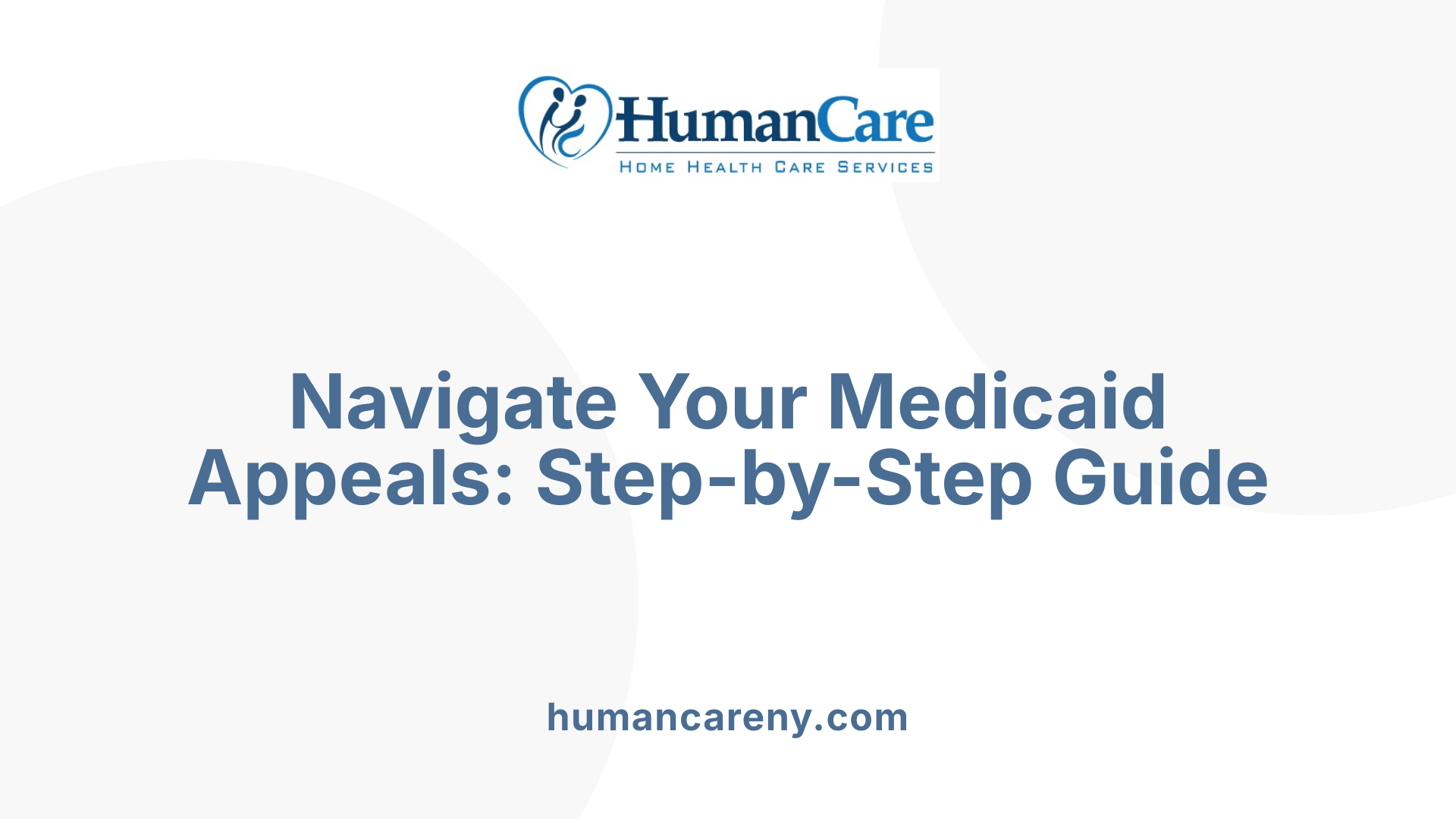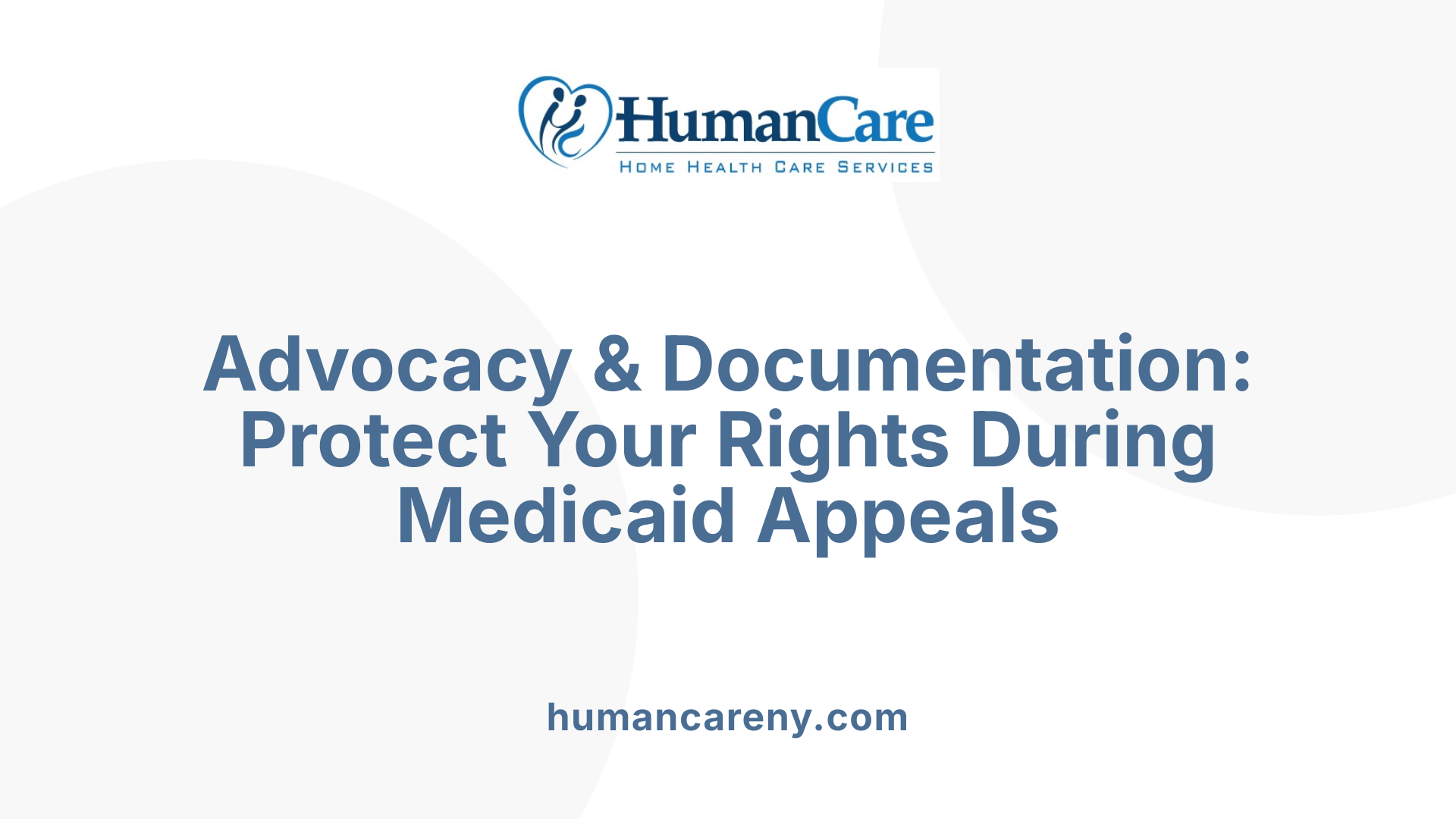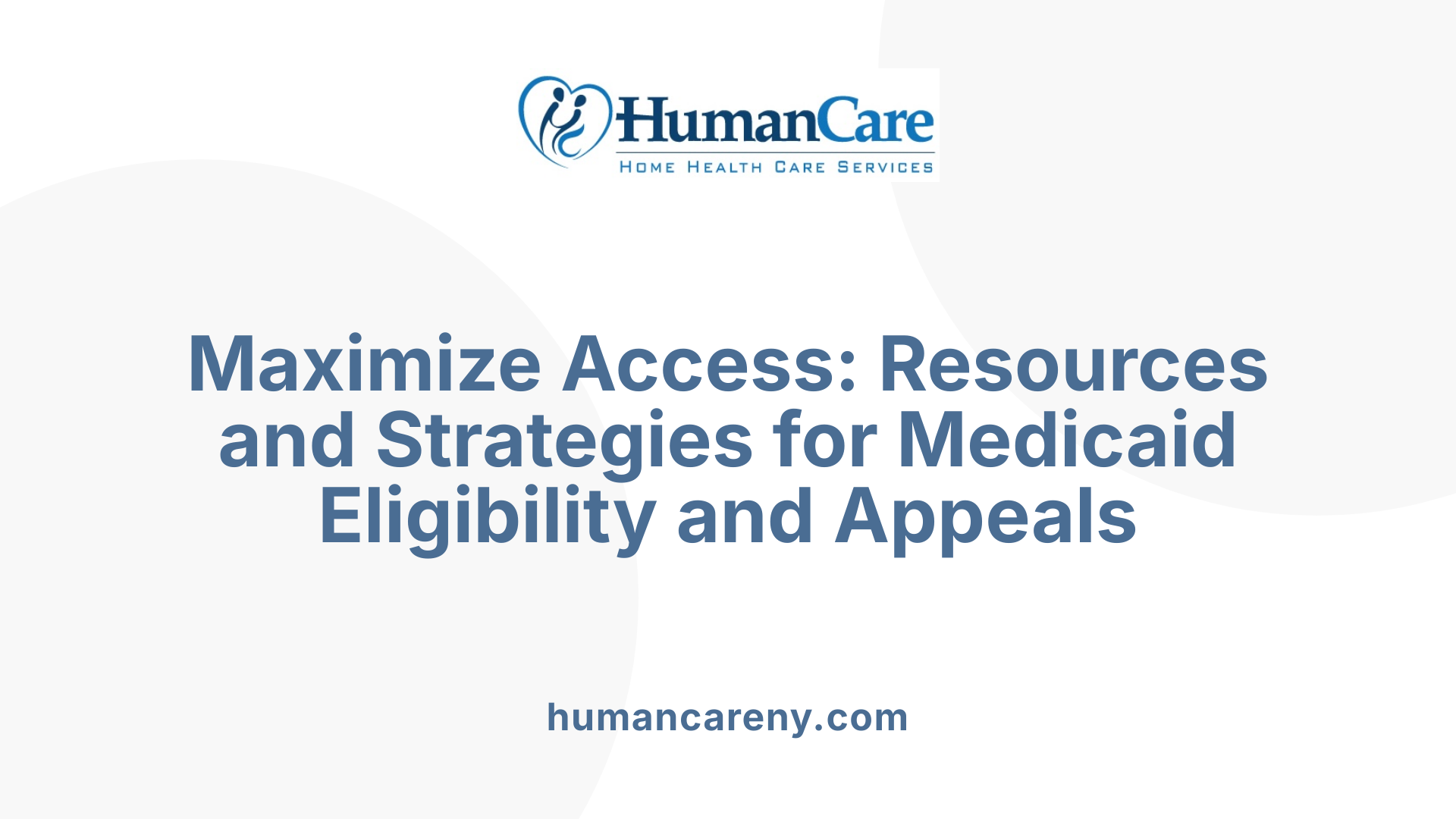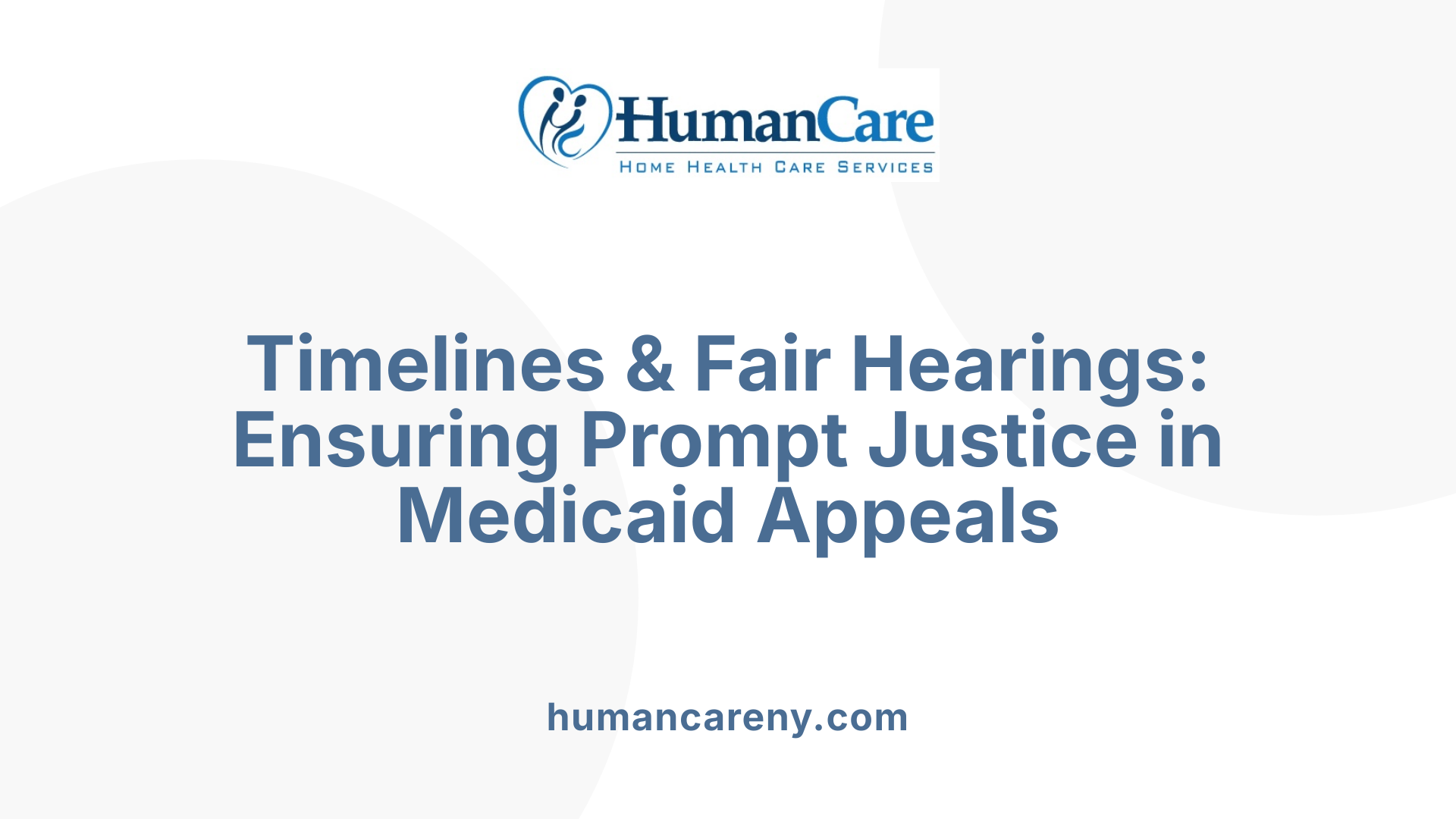Understanding and Navigating the Complex World of Medicaid Waivers and Appeals
For many families, securing and maintaining Medicaid benefits—particularly Medicaid waivers designed for home and community-based services—can be a complex journey filled with procedural hurdles and legal nuances. Navigating appeals is an essential part of safeguarding access to essential services for individuals with disabilities or chronic health conditions. This article provides a comprehensive guide to understanding the Medicaid waiver program, recognizing when and how to appeal adverse decisions, and utilizing available resources effectively.
The Structure of Medicaid Waiver Programs and Their Significance

What resources are available to help with Medicaid waiver eligibility and appeals?
Navigating Medicaid waiver programs can be complex, but numerous resources are designed to assist individuals and families through the eligibility and appeals process. State-specific agencies such as the Minnesota Department of Human Services and Virginia’s Division of Medical Assistance Services (DMAS) provide detailed guidance, application assistance, and support for those seeking to access or challenge their Medicaid services.
For appeals, individuals have multiple avenues to obtain help. They can contact the state’s Appeals Division via mail, telephone, fax, or relay services for those with hearing impairments. These offices are equipped to answer questions about the appeals procedures, deadlines, and necessary documentation.
Legal aid services are also a critical resource. Many local legal organizations offer free or sliding-scale representation for Medicaid-related disputes. Though agencies do not typically provide direct legal representation, advocates can help individuals understand their rights and guide them through filing appeals.
Online portals, such as Virginia’s Automated Intake and Management System (AIMS), streamline the appeal process, allowing users to file, track, and review their cases conveniently. Contact information—including addresses, phone numbers, and email addresses—for appeals offices is usually available on state health department websites.
Moreover, advocacy organizations like The Arc and community ombudsmen provide additional support by educating individuals on their rights and assisting with the documentation needed during appeals.
Overall, these resources aim to empower individuals to ensure fair access to Medicaid waivers and protect their rights during disputes. Using these services can significantly ease the burden of navigating complex regulations and help secure the community-based services many need.
Overview of Medicaid waivers including HCBS, Section 1115, and 1915(c) waivers
Medicaid waivers are specialized programs that allow states to offer additional or alternative services beyond standard Medicaid rules. They are tailored to meet specific population needs and facilitate community-based care.
Home and Community-Based Services (HCBS) waivers are among the most common, granting eligibility for services like personal care, home modifications, and respite care. They aim to enable individuals, especially those with disabilities and seniors, to live independently.
Section 1115 waivers are demonstration projects that testing new approaches to Medicaid delivery. They can expand coverage, improve service quality, or incorporate innovative models of care.
Section 1915(c) waivers specifically target long-term care, allowing states to provide home and community-based services to individuals who might otherwise require institutional care.
These waivers operate under federal guidelines but are administered by state agencies, which determine eligibility, services offered, and duration.
Purpose of waivers in providing community-based services
The primary goal of Medicaid waivers is to shift long-term care from costly institutional settings like nursing homes to the individual’s home or community. This approach promotes independence and dignity while often reducing overall healthcare costs.
Waivers also allow for tailored services that address the unique needs of each individual, such as employment support, transportation, and assistive technology. They support aging-in-place strategies and provide families with necessary respite and support.
Furthermore, waivers can serve as a proving ground for innovative health and social service models, potentially influencing broader Medicaid policy.
Eligibility criteria and services offered under waivers
Eligibility for Medicaid waivers varies by state but generally requires participants to demonstrate a need for long-term care, a particular diagnosis, or functional limitations.
Applicants usually undergo assessments, often including medical documentation and evaluations of daily living skills. Income and resource limits may also apply, though some waivers prioritize individuals with higher medical needs or those at risk of institutionalization.
Services provided under waivers typically include:
| Service Type | Description | Additional Details |
|---|---|---|
| Personal Care | Assistance with activities of daily living (ADLs) | Helps individuals remain in their homes |
| Home Modifications | Structural changes to accommodate disabilities | Covers ramps, grab bars, bathroom adjustments |
| Respite Care | Temporary relief for informal caregivers | Short-term or periodic support |
| Transportation | Specialized transport for medical appointments | Ensures access to healthcare |
| Employment Supports | Job coaching, training | Facilitates employment for disabled adults |
| Assistive Technology | Devices to improve independence | Includes communication aids and adaptive tools |
| Therapies | Physical, occupational, speech therapy | Tailored to individual needs |
Applying for a Medicaid waiver involves an initial application to the state Medicaid agency, often through a local Community Services Board (CSB). The process includes assessments, review of medical documentation, and determination of priority based on need.
While waiting, families can explore other community resources like Supplemental Security Income (SSI), Supplemental Nutrition Assistance Program (SNAP), and local transportation or employment programs.
Understanding the complexities of these programs enables individuals to make informed decisions and advocate effectively for their needs.
How are Medicaid waiver resources and appeals essential to service access?
Accessing Medicaid waivers and successfully navigating their appeals process are critical for many individuals seeking long-term, community-based support. The availability of resources and knowledgeable advocacy ensures that eligible individuals do not miss out on necessary services due to procedural barriers or misunderstandings.
These processes enable beneficiaries to challenge denials or reductions in services, ensuring they receive the support needed to maintain independence and quality of life. From legal assistance to online filing options, these tools are vital for safeguarding rights and securing essential care.
In conclusion, comprehensive resources and clear understanding are fundamental to maximizing the benefits offered by Medicaid waivers. They play an instrumental role in promoting equitable access and fostering systems that respect the dignity and needs of individuals with disabilities or chronic health conditions.
Understanding the Appeal Rights and Processes for Medicaid Participants

What is the process for appealing a Medicaid waiver program decision?
Appealing a Medicaid waiver decision involves multiple steps, starting with an internal appeal. In Virginia, for example, individuals must file this initial appeal with their Managed Care Organization (MCO) within 60 days of receiving an adverse decision. If they are not satisfied with the MCO’s response or if the appeal is denied entirely, the next step is to request a fair hearing from the Virginia Department of Medical Assistance Services (DMAS). This request must be made within 120 days, either online via the AIMS portal or in writing.
During a fair hearing, individuals have the right to access their case files, present evidence, call witnesses, and cross-examine adverse witnesses. Proper preparation and an understanding of the procedural rights are vital for a successful appeal. The fair hearing is conducted by an impartial third party, providing a formal and unbiased venue to challenge improper denials or benefit reductions.
This process is crucial for individuals who believe their rights have been violated or who wish to contest decisions that negatively impact their access to coverage or services. Knowing each step helps ensure timely and effective advocacy.
How does the appeal process work for Medicaid denial decisions?
When a benefit is denied, reduced, or terminated by Medicaid, the recipient receives a Notice of Adverse Benefit Determination. This notice outlines the reasons for the decision and instructions on how to appeal. The individual must submit an appeal request within a specific timeframe—usually between 30 and 60 days—depending on the state and the particular circumstances.
After the request is submitted, Medicaid or the managed care plan reviews the case internally. If the appeal outcome is unfavorable or unresolved, the next step is to request a formal fair hearing. The process for scheduling this hearing typically occurs within ninety days. At the hearing, both parties can review case files, submit evidence, and question witnesses, creating an equitable setting to contest the initial decision.
The hearing’s decision is communicated in writing. If the outcome is still adverse, individuals have further options, including seeking judicial review in court to challenge the decision legally. This step ensures that all disputes regarding Medicaid benefits are thoroughly examined, safeguarding beneficiaries’ rights.
What is the difference between internal agency appeals and formal fair hearings?
Internal agency appeals are the initial review processes conducted directly by Medicaid or Managed Care Organizations (MCOs). These appeals are meant to resolve issues quickly and often involve reviewing documentation and case facts internally. They are less formal and generally have shorter timelines.
Formal fair hearings, on the other hand, are official legal proceedings that provide a more structured environment to challenge Medicaid decisions. Conducted before an impartial hearing officer or judge, these hearings allow individuals to present evidence, call witnesses, and question the state’s witnesses. They are designed to provide a fair, unbiased review when internal appeals do not resolve the dispute.
Both pathways are part of the overall appeals process, with internal reviews serving as the first line and formal fair hearings acting as a subsequent, more comprehensive review.
Procedures for requesting fair hearings via mail, online, or in person
Requests for fair hearings can be made through several methods, depending on state policies. Common options include:
- Mail: Sending a written request to the designated Medicaid or state agency address.
- Online: Many states provide portals, like Virginia’s AIMS system, where individuals can submit requests electronically.
- In Person: Visiting a local Medicaid office or designated administrative office to file a request.
When requesting a fair hearing, individuals should include personal information, details of the adverse decision, and any supporting documentation. It is advisable to keep copies of all communications. Meeting the deadline for filing requests is critical; otherwise, the right to an appeal may be lost.
These procedures ensure individuals have accessible and straightforward options to contest Medicaid decisions, supporting their ability to advocate for necessary services and coverage.
Guidance on Requesting Fair Hearings and Preparing Your Case

What is the process for appealing a Medicaid waiver program decision?
Appealing a Medicaid waiver decision involves several important steps to ensure your case is properly reviewed. First, if you are dissatisfied with a decision made by your state's Medicaid or managed care organization, you should initiate an internal appeal. In states like Virginia, this must be done within 60 days of receiving the adverse decision. The appeal can be submitted either by mail, online, or via telephone, depending on your state's specific procedures.
If the internal appeal does not lead to a satisfactory resolution, you have the right to request a fair hearing. This is an independent review conducted by the state Medicaid agency. The hearing must be scheduled within a certain timeframe—generally within 120 days of your request. You can request a fair hearing online through portals such as AIMS, or through a written request sent to the appropriate state agency.
The fair hearing process provides an opportunity to present your case in detail. It involves reviewing your case file, gathering relevant supporting documentation, and understanding your procedural rights. During the hearing, you can examine the case evidence, call witnesses, and ask questions of the state’s witnesses. It is also permitted and often advisable to have representation by an advocate or an attorney.
Thorough preparation is crucial for success. Organize all relevant documents, such as medical records, correspondence, and assessments. Review the reasons for the initial denial carefully and prepare a clear, concise presentation of your case. Your ability to effectively communicate your needs and provide compelling evidence can strongly influence the outcome.
In summary, the process includes initiating an internal appeal promptly, escalating to a fair hearing if needed, and meticulously preparing your case with all supporting materials. Knowing your procedural rights—such as access to your case file, the right to confront witnesses, and to be represented—will help you navigate the process effectively and improve your chances of a favorable decision.
The Role of Documentation and Advocacy During the Appeal Process

Why is keeping detailed records and correspondence important during Medicaid appeals?
Maintaining a thorough record of all interactions and documentation is crucial in the appeal process. This includes copies of submitted forms, written communication from Medicaid agencies, assessment reports, and notes from phone calls or meetings. Detailed records help clarify what information was provided and when, serving as evidence if the case proceeds to formal hearings or legal review. Proper documentation ensures that families can quickly locate necessary information, respond to requests efficiently, and build a strong case to support their appeal.
What should families do to gather and organize medical and legal documentation?
Families should start by collecting all relevant medical records, assessments, diagnoses, and treatment histories that support the need for Medicaid services. Legal documents, such as notices of denial, appeal forms, and correspondence from Medicaid, should be organized chronologically. Creating a dedicated file—either digital or physical—can make retrieval easier. Listing key documents and their dates helps track the timeline and identify gaps. Keeping these materials well-organized provides a solid foundation for presenting a case during hearings or when consulting with advocates.
When and how should seeking legal or advocacy assistance be considered?
If families find the process overwhelming or confusing, seeking help from legal aid organizations or consumer assistance programs is advisable. Advocates can guide families through complex procedures, assist with preparing documentation, and represent them during hearings. Professional assistance is especially valuable if there are disputes over eligibility, complex medical needs, or language barriers. Legal and advocacy resources can improve the chances of a successful appeal by ensuring all procedural rights are protected and that families understand their options.
What resources are available to support families in advocacy efforts?
Several organizations offer assistance, including legal aid groups, disability advocacy organizations like The Arc, and state or local consumer assistance programs. These resources can help families understand their rights, prepare appeal documentation, and provide representation during hearings. Many agencies also offer bilingual services or auxiliary aids for those with disabilities, ensuring accessibility. Engaging with these organizations early in the process can strengthen a family’s case and provide reassurance through expert support.
How can families decide whether to appeal or reapply for Medicaid?
When determining whether to appeal or reapply, families should consider the reasons for the initial denial. If the mistake was clerical, or if recent documentation clarifies eligibility, reapplication might be sufficient. Conversely, if the decision appears incorrect or if circumstances have changed—such as income or health status—filing an appeal provides a formal review that could lead to retroactive benefits. Consulting with a Medicaid planner or advocate can help families evaluate their specific case and choose the most effective strategy.
How do families stay organized and advocate effectively during the appeals process?
Staying organized involves meticulous record-keeping and proactive communication. Families should maintain copies of all submitted paperwork, receive acknowledgments of receipt, and keep notes of each interaction with Medicaid agencies. Seeking assistance from advocates can further enhance efforts—they can help prepare for hearings, clarify procedural steps, and formally represent families if needed. Being well-organized and supported makes it easier to respond quickly to requests and to present a compelling case, ultimately improving the chances of a successful appeal.
Resources and Best Practices for Managing Medicaid Eligibility and Appeals

What resources are available to help with Medicaid waiver eligibility and appeals?
Families and individuals navigating Medicaid waivers and the appeals process have several helpful resources at their disposal. State agencies, such as Virginia's Department of Medical Assistance Services (DMAS) and Minnesota's Department of Human Services, offer extensive guidance and support for applicants and recipients. These agencies provide detailed instructions on how to initiate an appeal, including necessary documentation and procedural steps.
Contacting the appropriate appeals division can be done via multiple methods—mail, phone, fax, or relay services for those with hearing impairments. Many states also maintain online portals where individuals can file, track, and manage their appeal submissions conveniently. Virginia’s AIMS system is a typical example, allowing users to handle their appeals without visiting offices physically.
Legal assistance and advocacy organizations play an essential role. Local legal aid societies offer free or low-cost help, although they do not typically provide direct representation in appeals. Additionally, online resources such as explanatory videos and guides are available in multiple languages, making complex processes more accessible.
Furthermore, contact details—including addresses, phone numbers, and emails—are readily accessible online, ensuring individuals can reach the right offices for prompt assistance. Advocacy groups like The Arc or state protection agencies can offer personalized guidance, ensuring that rights are upheld and the appeals are conducted efficiently.
What are some additional resources families can explore during the waitlist or appeal process?
While waiting for Medicaid waiver approval or during the appeals process, families can turn to a variety of alternative programs and community services to meet urgent needs. Programs such as Supplemental Security Income (SSI) provide income support for individuals with disabilities, while SNAP offers food assistance to low-income families.
Other vital resources include the Low Income Home Energy Assistance Program (LIHEAP), which helps families manage utility costs, and transportation services that facilitate access to medical care and community activities.
Additionally, several community-based options like employment supports, therapies, respite care, and adult day programs can be accessed through local organizations. These services help improve quality of life and provide essential support while the family awaits Medicaid approval.
Engaging with advocacy organizations such as The Arc, or local protection and advocacy programs, can also be beneficial. They offer guidance, advocacy, and sometimes direct assistance during these challenging periods.
By proactively exploring these additional resources, families can ensure support and services remain consistent, reducing hardship and maintaining stability for their loved ones.
| Resource Type | Description | Examples & Contact Info |
|---|---|---|
| State Medicaid Assistance | Guidance, document review, appeal procedures | Virginia DMAS, Minnesota DHS, online portals |
| Legal and Advocacy Support | Legal aid, advocacy groups, informational videos | The Arc, local legal services |
| Alternative Social Programs | SSI, SNAP, LIHEAP, transportation, employment supports | Local offices, online applications |
| Community and Support Services | Respite, therapies, adult day services, home supports | Community centers, local non-profits |
| Online Self-Help Resources | How-to guides, videos, FAQs | State Medicaid websites, advocacy sites |
By utilizing these resources and adopting some best practices, families can navigate complex Medicaid systems more effectively, ensuring they access essential services and uphold their rights throughout the appeals process.
Special Considerations for Discharge and Service Continuity Appeals
What is the process for appealing a Medicaid waiver program decision?
When individuals face discharge from a skilled nursing facility or adult care home, there is a formal process to challenge such decisions. Residents or their representatives can request an appeal by filling out specific forms tailored to the type of facility involved. For discharges from skilled nursing facilities, the Nursing Home Hearing Request Form must be submitted. Conversely, for discharges from adult care homes, the Adult Care Home Hearing Request Form should be used.
These forms initiate the appeals process, allowing residents to request a formal hearing to contest the adverse discharge decision. The appeal provides an opportunity to present evidence and arguments supporting the need to remain in the current care setting.
In addition to initiating the appeal, parties can request continuances if they require more time to prepare their case or if unforeseen circumstances arise. Showing good cause, such as serious illness, death, lack of proper notice, or scheduling conflicts, can justify a delay in the hearing. Continuances help ensure fairness and allow residents to have proper representation and preparation.
During the appeal process, individuals can also seek to maintain their current services and care. This means requesting that services continue until a final decision is reached, preventing disruptive gaps in care. This is especially critical for individuals with complex needs who depend on consistent services.
Handling transfers between Medicaid plans while an appeal is pending involves careful coordination. If a person transfers to another Medicaid plan, it is essential to communicate with the new plan to ensure that authorized services are transmitted and continued without interruption. Proper communication between plans and adherence to procedures can safeguard ongoing access to necessary care.
Overall, the appeal process aims to protect individual rights, ensure fair hearings, and maintain continuity of care for Medicaid beneficiaries facing discharge or plan transfers. It is vital for residents and families to understand these procedures and to act promptly to safeguard their health and well-being.
Timelines and Conducting Hearings: Ensuring Fair and Prompt Resolution

What is the process for appealing a Medicaid waiver program decision?
Appealing a Medicaid waiver program decision involves several steps designed to ensure fairness and transparency. When a family or individual receives a denial or adverse action, they can initiate an appeal by requesting a formal fair hearing. This request must typically be submitted within a specific timeframe, often 60 days from the date of the adverse decision or denial.
Once the appeal is filed, the state Medicaid agency is responsible for scheduling a hearing, which generally occurs within a 90-day window. During this process, the individual or their representative can review the case file, bring witnesses, and present evidence supporting their appeal. It’s essential to prepare thoroughly, understanding the rights to representation, examination of documents, and questioning witnesses.
This process is critical for ensuring that each case is evaluated thoroughly and fairly. The hearing provides a platform not only for contesting decisions but also for clarifying the individual’s needs and circumstances. If the initial decision is upheld, the individual may have further avenues to appeal, including administrative reviews or judicial complaints.
Maintaining organized documentation and clear communication with the hearing office is crucial. The community or legal advocates can assist in this process, ensuring the appeal is handled correctly and efficiently. Overall, timely submission and adherence to procedural rules significantly influence the fairness and effectiveness of the appeal process.
Timelines and Conducting Hearings: Ensuring Fair and Prompt Resolution
The standard timeline for a state Medicaid agency to issue a decision after a fair hearing is approximately 90 days. This period allows sufficient time to review material, conduct hearings, and reach a decision. However, during extraordinary circumstances, such as public health emergencies like COVID-19, delays may happen due to temporary extensions granted by relevant authorities.
Parties involved in an appeal can request continuances for various reasons, including illness, death of a family member, lack of proper notice, or scheduling conflicts. To obtain a continuance, a formal request must be submitted, often demonstrating good cause—and these requests are evaluated based on individual circumstances. The decision to grant a continuance rests on the discretion of the hearing officer and the reasons provided.
The fairness of the process emphasizes accessibility and timeliness. Hearings should be scheduled promptly, and individuals must be given adequate notice and the opportunity to participate fully, either in person, by phone, or via videoconference. Ensuring an equitable process involves accommodating language needs and providing auxiliary aids for persons with disabilities, with these services being free of charge.
Ultimately, an efficient, fair, and accessible hearing process is essential to uphold individuals’ rights and restore trust in Medicaid’s administrative procedures. Continuous efforts to streamline procedures, manage scheduling effectively, and prioritize timely resolutions contribute significantly to just outcomes.
| Aspect | Typical Timeframe | Potential Delays | Evaluation Criteria |
|---|---|---|---|
| Fair hearing decision | Within 90 days | COVID-19 extensions, other emergencies | Case complexity, administrative workload |
| Continuance requests | Upon approval, case-by-case basis | Lack of notice, scheduling conflicts, health emergencies | Good cause, proper documentation |
| Hearing schedule | Usually within 90 days | Public health crises, staffing shortages | Urgency of case, administrative capacity |
Ensuring a transparent, timely, and fair hearing process is fundamental for safeguarding the rights of Medicaid beneficiaries. Clear communication, proper scheduling, and accommodations for disabilities or language barriers contribute to effective resolutions and uphold the integrity of the appeals system.
Advocacy and Vigilance: Securing Your Rights and Benefits
Navigating Medicaid waiver appeals can be challenging, but with a clear understanding of the process, access to credible resources, and proactive advocacy, families can effectively challenge adverse decisions and secure the care their loved ones need. Staying organized, informed, and engaged in each step—from requesting hearings to presenting evidence—maximizes the chances of success. Remember, legal and advocacy entities are valuable allies in this journey. Ultimately, persistent effort and knowledge empower families to protect their rights and ensure continuous access to vital services.
References
- Appeals and Grievances | NC Medicaid
- [PDF] Understanding Medicaid Fair Hearings
- Appeals Policies and Processes - Alliance Health
- Home and Community Based Services (HCBS) Waivers
- [PDF] A Guide to the Medicaid Appeals Process - KFF
- What Is A Medicaid Waiver? Your Guide To ... - AssistedLiving.org
- Navigating Medicaid for Families in Need - Number Analytics



